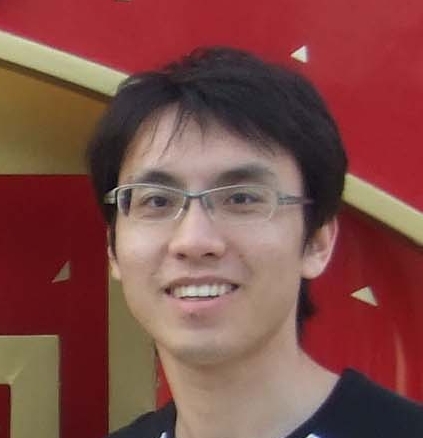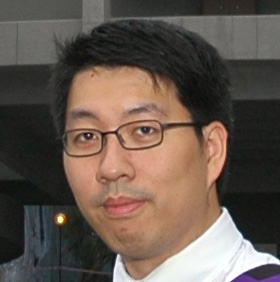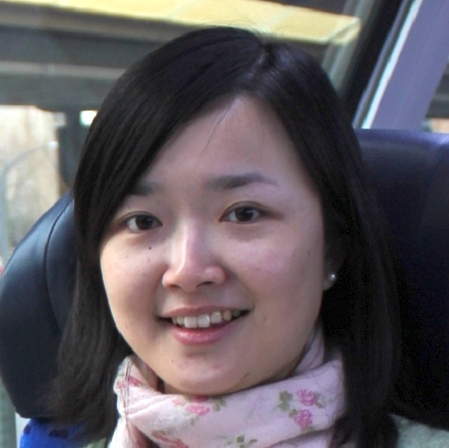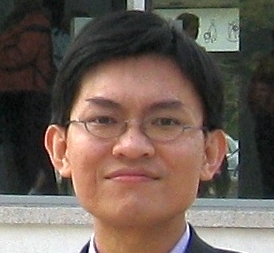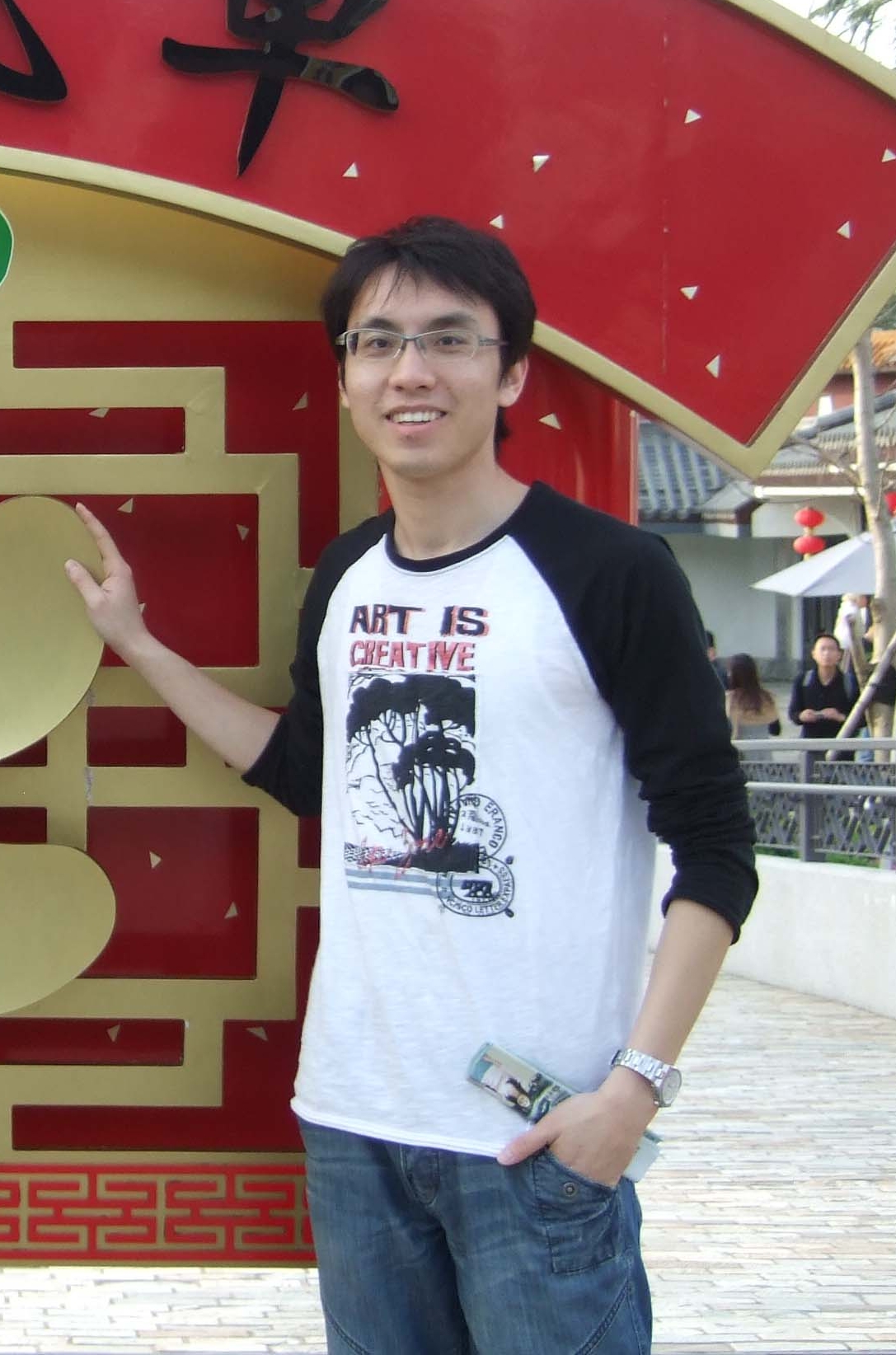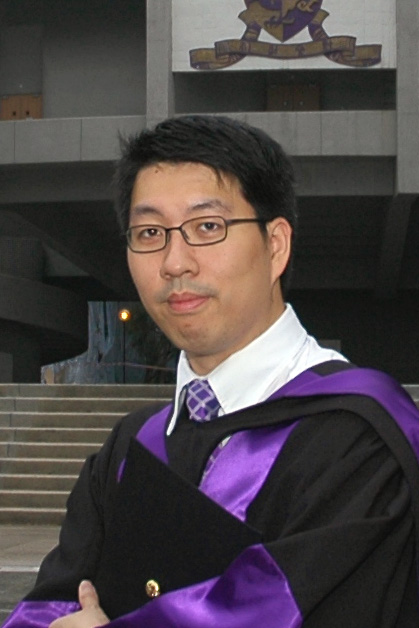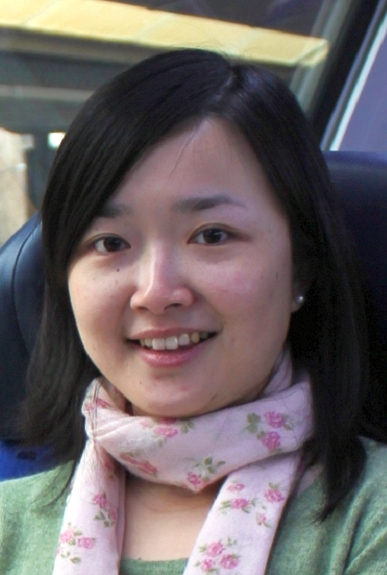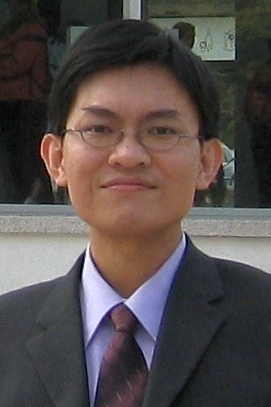Homepage
Home
Objective
A series of lectures on current research in wireless communication technology.
Syllabus
Learning Outcome
Objective
A series of lectures on current research in integrated circuits and systems.
Syllabus
The course is intended to cover the current technology and interest in Integrated Circuits and Systems. With the continuous increase in design complexity, new design tools and methodologies are constantly introduced to handle rising complexity and to maintain design productivity. In addtion, new technology will often give rise to new design issues and considerations.
Learning Outcome
- To appreciate the current issues and trends in Integratred Circuit design
- To acquire the skill to use new design tools
- To understand new design flow
|
CHENG, Zhenzhou 程振洲
我很榮幸能獲得香港博士研究生獎學金計劃的資助,進入中大電子工程學系修讀晢學博士課程。實驗室內的學術氣氛自由開放,鼓勵我發掘自己最喜愛的研究題目。指導老師運用他的創意和力臻完美的精神,教導我如何完成一個影響重大的研究項目。經過逾兩年的時間,通過電子工程學系的晢學博士課程、海外會議及學術知識,我的專業知識、研究能力和演講技巧得到顯著的提昇。我在電子工程學系得到的訓練和經歷,讓我更清晰自己未來的事業規劃,並且助我為此作好準備。 |
|
MAK, Lawrence Chun Man 麥振文
香港中文大學電子工程學系為研究生提供卓越的環境,讓他們學習先進技術和參與相關研究工作。在我修讀晢學碩士及博士課程期間,我有一個好的機會透過接觸頂尖設備和實驗室儀器了解更多這行業的專業範疇,無數知識豐富的學生與來自各地的學者給予我啟發,互相分享意見和研究所得對我的研究工作幫助很大。學系提供的不同的研究科目拓闊了我在研究方法和應用技術方面的視野。我在中大的學習,確切助我在面對電子學研究領域的挑戰前做好準備。 |
|
FAN, Vivian Wen 范文
電子工程學系專用集成電路/超大型積體電路實驗室的環境自由輕鬆。作為博士生,我可以選擇自己感興趣的研究題目。我不是逐步跟隨指示,而是學會在四年裡計劃和安排自己的研究進度。我身邊的每個人都很用功,正因如此,我們每年都有很好的研究論文。我受指導老師鼓勵參與海外會議,有機會與我研究領域的專家交流,偶爾亦會受其他人的工作啟發。我從電子工程學系取得的並非只有博士學位,我對自己範疇的新技術變得更敏感,同時對研究更具熱誠。 |
|
CHOW, Chi Wai 鄒志偉
我在香港中文大學電子工程學系開始大學學習和研究工作。博士畢業後,我獲聘任為中大的博士後研究員。2005年,我以博士後研究科學家身份加入愛爾蘭延得耳國立研究院。2007年,我加入台灣國立交通大學(NCTU)光電系,成為助理教授。現在我是NCTU的教授。 我想對中大電子工程學系的教授表達謝意,他們全力投身教學和研究工作。我亦想特別深切感謝我畢業專題研習和博士的指導老師曾漢奇教授,感激他的教導和指引。 在電子工程學系八年期間,高水平的課程讓我印象深刻,為我在數學、物理和電子工程其他範疇提供廣闊和穏固的基礎。此外,我享受電子工程學系良好的學習和研究環境,亦享受在修讀博士課程時每天到實驗室。雖然我已畢業近十年,我仍能得到電子工程學系大家庭的支持。 |
|
CHENG, Zhenzhou 程振洲
It is my honor to receive the Hong Kong Ph.D. Fellowship and join EE Department of CUHK to pursue the Ph.D. degree. With the free and open academic atmosphere in the laboratory, I am encouraged to discover my favorite research topic. The supervisor teaches me how to complete a high impact research work with his creativity and strive for excellence. In more than two years, the Ph.D. programme of EE Department as well as the international conferences and academic exchange have brought me an obvious improvement in terms of professional knowledge, research capacities, and presentation skills. The training and experiences in EE Department let me have a clear planning for future career, and help me to be fully prepared. |
|
MAK, Lawrence Chun Man 麥振文
The EE Department of CUHK offers an excellent environment for graduate students to learn state-of-the-art technology and get involved in the related research work. During my M.Phil. and Ph.D. studies, I could have a good chance to understand more about the professional side of the field through handling the top-notch facilities and equipments in the laboratories, not to mention being inspired by numerous knowledgeable students and scholars from different places. The sharing of ideas and findings smoothed my research work to a great extent. Various graduate courses offered by the Department widened my horizon in terms of research methods and the use of technology. My studies at CUHK do help me to be well-equipped before facing the ongoing challenges in the electronics research field. |
|
FAN, Vivian Wen 范文
The atmosphere of ASIC/VLSI Lab in EE Department is free and easy. As a Ph.D. student, I could choose the research topic I am interested in. Instead of being told what to do step by step, I learned to plan and organize my research progress in four years. Everyone around me worked very hard, which was the reason that we have good publications every year. I was encouraged to attend international conferences by my supervisor, so that I could communicate with other experts in my research area and sometimes inspired by others’ works. Ph.D. degree is not the only thing I obtained from EE Department. I become more sensitive to new techniques in my area and I have much greater passion in research. |
|
CHOW, Chi Wai 鄒志偉
I started my university study and research career in the EE Department of CUHK. After Ph.D. graduation, I was appointed as a Postdoctoral Fellow in CUHK. In 2005, I joined the Tyndall National Institute, Ireland as a Postdoctoral Research Scientist. In 2007, I joined the Department of Photonics, National Chiao Tung University (NCTU), Taiwan, as an Assistant Professor. Now, I am a Professor in NCTU. I would like to express my appreciation for the Professors in the EE Department of CUHK who have committed their whole career in education and research. I would also like to express my sincere gratitude to my FYP and Ph.D supervisor, Prof. Tsang Hon Ki for his teaching and guidance. During my eight years life in EE, I was deeply impressed by the high standard curriculum, which provided me a broad and firm foundation in mathematics, physics and many areas of EE. In addition, I enjoyed the good study and research environment in EE, and I enjoyed going to the Lab everyday when I was purchasing my Ph.D. degree. Even though I have graduated for about 10 years, I can still get support from the EE family. |
Q1. Question: When is the deadline for application?
Answer:
Main Round: 1 December 2025
Clearing Round: 31 March 2026
(Applications in Clearing Round will only be considered subject to availability of places.)
Early applications will be under our first-tier consideration. For truly outstanding candidates, exceptional early or late offers would be possible. Applicants should ensure all application materials arrive at the department office before the respective application deadlines to ensure sufficient time for validation and processing of their documents.
**To be considered for interview in early December, please submit the application materials as early as possible and preferably by 10 November 2025. Shortlisted applicants will be informed by email in due course.**
Candidates who consider themselves outstanding and are interested in CUHK electronic engineering research are encouraged to apply for the CUHK EE PhD programme and the HKPFS jointly. The application deadline of the HKPFS is 1 December 2025 at Hong Kong Time 12:00:00 (GMT +8 hours). Please visit https://www.gs.cuhk.edu.hk/admissions/scholarships-fees/hkpfs for more details.
**To be considered for HKPFS or main round admission, all required documents should be submitted to the online systems by 1 December 2025.**
Q2. Question: Where can I submit online application?
Answer:
Online application is available at https://www.gs.cuhk.edu.hk/admissions/admissions/how-to-apply.
Q3. Question: What materials need to be included in my application?
Answer:
Please read the information on the Graduate School's website https://www.gs.cuhk.edu.hk/admissions/ carefully. In addition to the application materials generally required by the Graduate School (https://www.gs.cuhk.edu.hk/admissions/admissions/documents-required), applicants must also submit the following application materials to the Graduate Schoo's Online Application System:
Applicants normally will receive an email from our Division in around five working days after submitting the online application. Applicants will be required to upload all mandatory and required application materials to our Division's online system for review by the selection panel.
List of Mandatory materials for All Applicants:
- Complete online application
- Application fee
- One photocopy of your HKID card or other identity document as given in the Application Form
- Original and complete official transcripts covering all semesters/terms for all tertiary level studies. Any missing study periods should be supported with valid documents.
- Original certification letter of Cumulative GPA (cGPA) or Weighted Average Score (加權平均分) issued by the University (if not attached to the official transcript)
- Original official letter or explanation notes of the official grading schemes (成績等級與績點換算關係表) (if not attached to the official transcript)
- Original official ranking certificate issued by the University (if available)
- Copies of Degree Certificate (for degree holder only)
- Copies of certificates of academic/professional qualifications (if available), may include university certificates of graduation, examination certificates and proof of other qualifications.
- All documents, including transcript and certifying letters, must be issued by the appropriate offices, i.e. the Registry (教務處), Undergraduate Office (本科生院), Graduate School (研究生院) or Archives Office (檔案館) with their official stamps.
- Assessment report from the HKCAAVQ (if necessary)
- Original valid official score report of TOEFL (University's institution code: 0812)/IELTS (Academic)/GMAT (Verbal) sent directly from the test organization to the University (HKPFS only accepts score report of TOEFL or IELTS (Academic))
- Detailed list of awards and scholarships with supporting documents (e.g. award certificates, official website or email announcement, etc.)
- Invite THREE referees to complete the Confidential Recommendations Report (submit through the Graduate School's Online Application System)
Mandatory materials for applicants from Mainland China:
- Copies of Mainland ID card and Hong Kong and Macao Travel Permit (if applicable).
- All Applicants who are studying in universities in Mainland China are required to provide a valid Chinese version of Online Verification Report of Student Record (教育部學藉在線報告) issued by the CHESICC (學信網) issued by the CHESICC (學信網): https://www.chsi.com.cn/xlcx/bgys.jsp.
- Applicants who obtained degrees from universities in Mainland China are required to provide a valid Chinese version of Online Verification Report of Higher Education Qualification Certificate (教育部學歷證書電子註冊備案表) and a valid Online Verification Report of Higher Education Degree Certificate (中國高等教育學位在線驗證報告) issued by the CHESICC (學信網) : https://www.chsi.com.cn/xlcx/bgys.jsp.
- Applicants who obtained degrees from universities in Mainland China are required to provide copies of official Chinese version of Degree Certificate (學士學位証書) and Academic Credential (畢業証書) with photos.
- Applicants from Mainland Joint programmes of Chinese-Foreign Cooperation in Running Schools (CFCRS) (中外合作办学) are required to provide detailed information about the programme and a valid proofing document(中外合作辦學境外學歷學位證書認證)generated from the CFCRS platform (中华人民共和国教育部中外合作办学监管工作信息平台): https://www.crs.jsj.edu.cn/.
Other required application materials:
- Brief Curriculum Vitae
- An information sheet to be filled in. It is a standard format specified by our department which essentially summarizes the personal information and academic qualification. It can be downloaded from here.
- Research / purpose statement (about 600 - 800 words in English, compulsory for PhD application)
- Personal statement
- Copies or abstracts of published papers or research project reports (if available)
- Recommendation letter by the past / current affiliated institution(s) (if available)
Remarks
CUHK qualifications (Bachelor's or higher degrees):
- Photocopies of official transcripts (Student Copy) issued by CUHK are accepted (not applicable to CUHK (Shenzhen) qualifications). However, the University reserves the right to require applicants to submit original transcripts.
Other qualifications:
- Starting from the 2020-21 intake, scanned copies of the latest official academic transcripts with official chop from the Registry or Office responsible for handling student records is accepted for issuing the admission offers. However, documents printed from the system or any other documents without a proper letterhead and an official chop will not be accepted. Besides, there should be explanatory notes printed / attached to the transcript indicating the grading scheme of the University.
- Original Official transcripts and certifying letters should be sent directly to relevant Graduate Division from the issuing university. All documents, including transcript and certifying letters, must be issued by the appropriate offices, i.e. the Registry (教務處), Undergraduate Office (本科生院), Graduate School (研究生院) or Archives Office (檔案館) with their official stamps.
- Certificates and transcripts, which are not in English or Chinese, should be accompanied by an official certified translation in English.
- Some universities may only issue electronic official transcripts to other institutions. In that event, official electronic transcripts should be sent to relevant Graduate Division (mailto: This email address is being protected from spambots. You need JavaScript enabled to view it.) directly from the issuing university.
- Applicants with degrees awarded by overseas universities by distance learning or by completing a curriculum of short duration may be required to provide assessment report from the Hong Kong Council for Accreditation of Academic & Vocational Qualifications (HKCAAVQ) on the level of qualification obtained. Applicants will be notified by the Graduate Division concerned separately.
- The certified true copy must be issued by the official organization or relevant test organization. The University may require applicants to provide the original documents for verification.
- The University may require applicants to provide verification reports of the qualification obtained (e.g., verification report issued by the China Academic Degrees and Graduate Education Development Center). Applicants will be notified by the Graduate Division concerned/Graduate School separately.
- Admitted students are required to submit original copies of those official documents for verification by the conditions fulfillment deadline. Otherwise, they will not be allowed to register and commence studies at the University. Official transcripts should be sent directly to relevant unit stated in Admission Notification in a sealed envelope from the issuing university.
Proof of English Language proficiency
- A copy of graduation certificate issued by a university in Hong Kong; or
- A certifying letter issued by the Registry of the university confirming the medium of instruction of your degree programme was English; or
- TOEFL and IELTS are considered valid for two years from the test date. GMAT is considered valid for five years from the test date. (The official score report should be sent directly from the test organization to the University)
- Applicants for the Hong Kong PhD Fellowship Scheme (HKPFS) are required to submit score reports of TOEFL / IELTS (Academic). GMAT result is not accepted.
Applicants are required to upload all mandatory supporting documents to the Graduate School and Division by the application deadline. Otherwise, the applications may not be further processed.
The University may require applicants to submit additional information or documentary proof if deemed necessary. All documents submitted will not be returned and will be destroyed if the application is unsuccessful.
Postal address for submitting original official documents for applications:
Division of Electronic Engineering (MPhil-PhD)
Room 404, Ho Sin Hang Engineering Building,
The Chinese University of Hong Kong,
Shatin, NT, Hong Kong SAR,
P.R. China
** Please always quote the Application No. in the correspondences.
Q4. Question: How can I pay the application fee?
Answer:
You can pay the application fee by a valid credit card.
Q5. Question: How can I apply for the financial assistance?
Answer:
Postgraduate Studentship (PGS) is a form of financial assistance provided to full-time PhD and MPhil students. Students admitted with PGS do NOT need to make a separate application. The monthly stipend for Postgraduate Studentship is around HK$19,100 ~ HK$19,660 for academic year 2025-26.
Q6. Question: What are the requirements on English proficiency?
Answer:
All students should fulfil the English Language Proficiency Requirement prescribed by Graduate School before they are admitted.
Please refer to the Graduate School website for the information of English Language Requirements for Admission:
https://www.gs.cuhk.edu.hk/admissions/admissions/requirements#english-language-requirements-for-admission
Q7. Question: Should I have a GRE?
Answer:
GRE is highly recommended, but not compulsory. It may be used as a good reference.
Q8. Question: How will my application be processed?
Answer:
First of all, we will check whether your application is complete and valid. That is, it must contain all required materials.
An incomplete application will normally not be considered.
A valid application will go through a preliminary assessment by all academic staff in our department, based on which we will decide whether the applicant should be invited for an interview.
Q9. Question: Will there be an interview for every candidate?
Answer:
Only some of the candidates will be selected for interview.
Q10. Question: How will the interview be arranged for applicants outside Hong Kong?
Answer:
In principle interview is a necessary process for each admitted applicant. For applicants in Mainland China, we will arrange interviews in Shenzhen. You need to make your own travel arrangement to attend the interview. For overseas applicants, sometimes there is special arrangement, e.g. video conference interview. But whenever possible, we require the applicant to attend face-to-face interview.
Q11. Question: When will the interviews be held?
Answer:
The admission schedule may be different from year to year. Mostly, the interview will be arranged from December. Only selected candidates will be invited to attend the interview.
Q12. Question: What if I can't attend the interview?
Answer:
Normally if you are invited to an interview but fail to attend, you must give very good reasons. Otherwise, your application will be given lower priority than those we know better via the interview.
Q13. Question: When and how will I be informed of the result of my application?
Answer:
We will try to let you know the result as soon as possible. Normally it will be within 3 to 4 weeks after the interview. However, in some cases, the decision may be made at a fairly late stage, for example, in April or May. Please note that an official admission offer must be issued only by the department or the graduate school.
- For applicants who apply for PhD programmes through HKPFS, Research Grants Council will announce results around April.
- For applicants who apply for MPhil/PhD or taught postgraduate programmes directly with the University (i.e. non-HKPFS applicants), you may login the Application for Admission to Postgraduate Programmes and check your application results in the section of "View Application Result". (link: https://www.gradsch.cuhk.edu.hk/OnlineApp/login_email.aspx)
- Applicants who do not receive notification by early September can assume their applications have been unsuccessful. No written notification will be sent to unsuccessful applicants.
Q14. Question: What are the most important considerations for admission?
Answer:
We emphasize on the capability and potential of the candidates in doing high-quality and independent research work. While this can be seen from your previous academic records (i.e. transcripts), your performance during the interview is also important. To demonstrate your research capability, you may wish to provide us with research papers or reports authored by you. Your skill in technical presentation is another important factor.
Q15. Question: Can I have any advice on how to prepare a good application?
Answer:
- Focus on aspects that are related to your academic performance at university level or above. It may not be wise to spend a lot of time describing how good you were in the primary and secondary school.
- Avoid writing lengthy description about yourself. Highlight a few important points that can impress people.
- If you have many award certificates to show us, select only the most important ones. Otherwise, they may be confusing
- You are highly recommended to contact the teaching staff whose research area is most interesting to you. This may help you to acquire more useful information and to form a decent study plan.
Q16. Question: What should be included in the Research/purpose statement?
Answer:
In the research/purpose statement, please state your true feeling in your own words why you need to have this graduate study opportunity in relation to your life and career objectives, why the research area and topic that you have chosen, and why in the Department of Electronic Engineering at the Chinese University of Hong Kong. If you have formal research experience or if you have some very good ideas about your future research project, please also provide a concise research proposal to present your ideas on this intended research project. Copying from templates or samples downloaded from the Internet is very negative to your application portfolio and is therefore strongly recommended against.
Q17. Question: What if I still have questions after reading the above?
Answer:
Please mail to: This email address is being protected from spambots. You need JavaScript enabled to view it. for more information.




